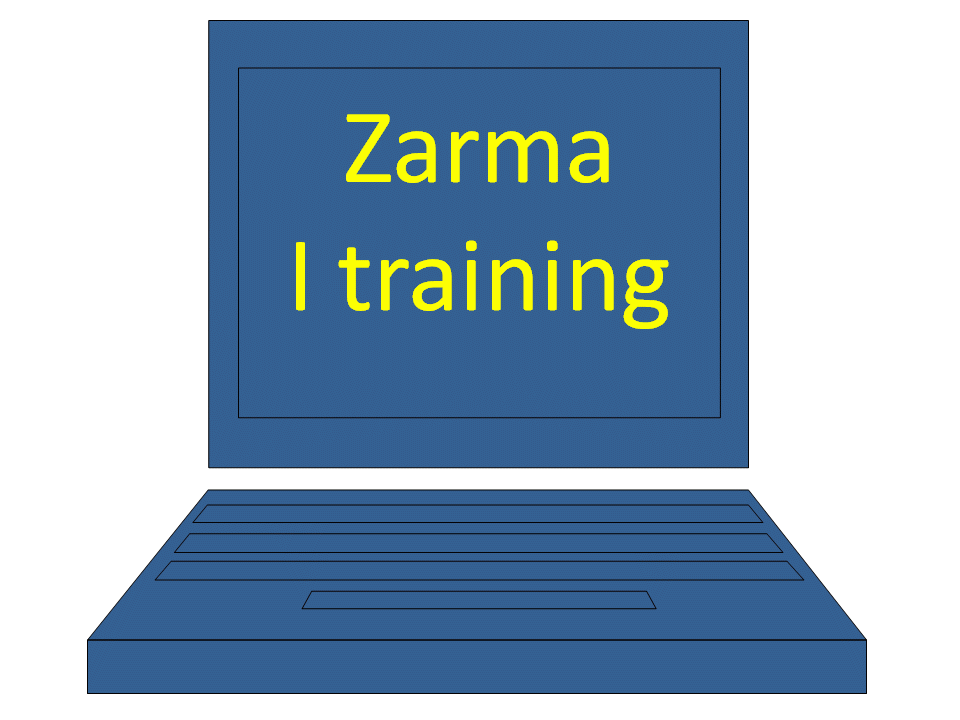conjugations of verbs |
Zarma verbs are not conjugated like in English. In Zarma there are no conjugation endings, the verb itself never changes, either for person or number. Our ideas of time (verb tense) and Zarma ways of looking at time don't really coincide. Actual time elements will quite often be gotten from the context rather than from the verb, though if a verb has auxiliaries, they can give some clues. In the indicative mood, a Zarma verb really can show just one of two things: whether the action is completed (perfect) or not (imperfect).
To express incomplete action or state in progress at a specific time, Zarma uses – like in English – a continuous or progressive aspect.
Two irrealis moods are of importance in Zarma subjunctive and imparative.
Conjugation of verbs are given for perfect, imperfect, continuous, subjunctive and imparative. For each of them, there are four tables:
- possitive, sentence without direct object
- possitive, sentence with direct object
- negative, sentence without direct object
- negative, sentence with direct object
In each table an example of a regular and an irregular verb is included.
Notes:
- the verb "to be" and "to have" are discussed separately.
- irregular verbs with respect to sentence order are discussed here.
|
|
| |
Perfect |
A Zarma verb without any auxiliaries is in the past positive tense or, more correctly, in the completed positive tense (or state of being), see Lesson 1.D.5. When the direct object precedes the verb, the direct object is pointed out and distinguished from the subject by the particle 'na' in the past positive. This 'na' precedes the direct object, see Lesson 2.C.2.
The past negative is formed by placing the negative 'mana' after the subject where the auxiliary regular goes whether the direct object is present or not, see Lesson 8.D.1. |
Positive
Sentence without direct object
| Regular verb: haŋ (to drink) |
Irregular verb: di (to see) |
| Ay haŋ. |
Ay di. |
| Ni haŋ. |
Ni di. |
| A haŋ. |
A di. |
| Iri haŋ. |
Iri di. |
| Araŋ haŋ. |
Araŋ di. |
| I haŋ. |
I di. |
Sentence with direct object
Regular verb: haŋ (to drink)
Direct object: hari (water) |
Irregular verb: di (to see)
Direct object: musu beeri (lion) |
| Ay na hari haŋ. |
Ay di musu beeri. |
| Ni na hari haŋ. |
Ni di musu beeri. |
| A na hari haŋ. |
A di musu beeri. |
| Iri na hari haŋ. |
Iri di musu beeri. |
| Araŋ na hari haŋ. |
Araŋ di musu beeri. |
| I na hari haŋ. |
I di musu beeri. |
Negative
Sentence without direct object
| Regular verb: haŋ (to drink) |
Irregular verb: di (to see) |
| Ay mana haŋ. |
Ay mana di. |
| Ni mana haŋ. |
Ni mana di. |
| A mana haŋ. |
A mana di. |
| Iri mana haŋ. |
Iri mana di. |
| Araŋ mana haŋ. |
Araŋ mana di. |
| I mana haŋ. |
I mana di. |
Sentence with direct object
Regular verb: haŋ (to drink)
Direct object: hari (water) |
Irregular verb: di (to see)
Direct object: musu beeri (lion) |
| Ay mana hari haŋ. |
Ay mana di musu beeri. |
| Ni mana hari haŋ. |
Ni mana di musu beeri. |
| A mana hari haŋ. |
A mana di musu beeri. |
| Iri mana hari haŋ. |
Iri mana di musu beeri. |
| Araŋ mana hari haŋ. |
Araŋ mana di musu beeri. |
| I mana hari haŋ. |
I mana di musu beeri. |
|
| |
|
Imperfect |
The present tense of the verb uses the same auxiliary as the future tense does, see Lesson 3.D.2. This is the auxiliary 'ga'. Like in English the repeated or habitual action are distinguished from the progressive or continuous present, see Lesson 5.D.3. The auxiliary 'ga' is only used in case of a habitual action.
The negative of the present and future tenses is formed with the negative 'si' that replaces 'ga'. Note that for present it must be actual present action, not a present state dependent on past action, see Lesson 8.D.2. |
Positive
Sentence without direct object
| Regular verb: haŋ (to drink) |
Irregular verb: di (to see) |
| Ay ga haŋ. |
Ay ga di. |
| Ni ga haŋ. |
Ni ga di. |
| A ga haŋ. |
A ga di. |
| Iri ga haŋ. |
Iri ga di. |
| Araŋ ga haŋ. |
Araŋ ga di. |
| I ga haŋ. |
I ga di. |
Sentence with direct object
Regular verb: haŋ (to drink)
Direct object: hari (water) |
Irregular verb: di (to see)
Direct object: musu beeri (lion) |
| Ay ga hari haŋ. |
Ay ga di musu beeri. |
| Ni ga hari haŋ. |
Ni ga di musu beeri
|
| A ga hari haŋ. |
A ga di musu beeri
|
| Iri ga hari haŋ. |
Iri ga di musu beeri
|
| Araŋ ga hari haŋ. |
Araŋ ga di musu beeri
|
| I ga hari haŋ. |
I ga di musu beeri
|
Negative
Sentence without direct object
| Regular verb: haŋ (to drink) |
Irregular verb: di (to see) |
| Ay si haŋ. |
Ay si di. |
| Ni si haŋ. |
Ni si di. |
| A si haŋ. |
A si di. |
| Iri si haŋ. |
Iri si di. |
| Araŋ si haŋ. |
Araŋ si di. |
| I si haŋ. |
I si di. |
Sentence with direct object
Regular verb: haŋ (to drink)
Direct object: hari (water) |
Irregular verb: di (to see)
Direct object: musu beeri (lion) |
| Ay si hari haŋ. |
Ay si di musu beeri. |
| Ni si hari haŋ. |
Ni si di musu beeri
|
| A si hari haŋ. |
A si di musu beeri
|
| Iri si hari haŋ. |
Iri si di musu beeri
|
| Araŋ si hari haŋ. |
Araŋ si di musu beeri
|
| I si hari haŋ. |
I si di musu beeri
|
|
| |
|
Continous aspect |
The progressive or continuous present and past positive use the auxiliary 'go no ga' plus verb. It expresses the idea of being in the act or process of doing the action. The auxiliary 'go ga' also shows the progressive or continuous aspect of the verb. It may also sometimes contains the idea of having just begun the action. This and the previous are generally interchangeable for showing action in progress, see Lesson 5.D.3. and 15.C.1.
The progressive present and past negative use the auxiliary 'si no ga' or 'si ga' plus verb, see Lesson 10.C.3.
Special auxiliaries (see Lesson 5.D.3.)
An action about to take place or the idea of 'to be about to' do something is shown be using 'ga ba ga' as auxiliaries before the verb.
The verbs 'kaa' (to come) and 'koy' (to go) use as auxiliaries 'go' or 'go no', before the verb to show the immediate present. Or the 'go no' may be separated with the first half before the verb and the rest after it; this is more emphatic. |
Positive
Sentence without direct object
| Regular verb: haŋ (to drink) |
Irregular verb: di (to see) |
| Ay go (no) ga haŋ. |
Ay go (no) ga di. |
| Ni go (no) ga haŋ. |
Ni go (no) ga di. |
| A go (no) ga haŋ. |
A go (no) ga di. |
| Iri go (no) ga haŋ. |
Iri go (no) ga di. |
| Araŋ go (no) ga haŋ. |
Araŋ go (no) ga di. |
| I go (no) ga haŋ. |
I go (no) ga di. |
Sentence with direct object
Regular verb: haŋ (to drink)
Direct object: hari (water) |
Irregular verb: di (to see)
Direct object: musu beeri (lion) |
| Ay go (no) ga hari haŋ. |
Ay go (no) ga di musu beeri. |
| Ni go (no) ga hari haŋ. |
Ni go (no) ga di musu beeri
|
| A go (no) ga hari haŋ. |
A go (no) ga di musu beeri
|
| Iri go (no) ga hari haŋ. |
Iri go (no) ga di musu beeri
|
| Araŋ go (no) ga hari haŋ. |
Araŋ go (no) ga di musu beeri
|
| I go (no) ga hari haŋ. |
I go (no) ga di musu beeri
|
Negative
Sentence without direct object
| Regular verb: haŋ (to drink) |
Irregular verb: di (to see) |
| Ay si (no) ga haŋ. |
Ay si (no) ga di. |
| Ni si (no) ga haŋ. |
Ni si (no) ga di. |
| A si (no) ga haŋ. |
A si (no) ga di. |
| Iri si (no) ga haŋ. |
Iri si (no) ga di. |
| Araŋ si (no) ga haŋ. |
Araŋ si (no) ga di. |
| I si (no) ga haŋ. |
I si (no) ga di. |
Sentence with direct object
Regular verb: haŋ (to drink)
Direct object: hari (water) |
Irregular verb: di (to see)
Direct object: musu beeri (lion) |
| Ay si (no) ga hari haŋ. |
Ay si (no) ga di musu beeri. |
| Ni si (no) ga hari haŋ. |
Ni si (no) ga di musu beeri
|
| A si (no) ga hari haŋ. |
A si (no) ga di musu beeri
|
| Iri si (no) ga hari haŋ. |
Iri si (no) ga di musu beeri
|
| Araŋ si (no) ga hari haŋ. |
Araŋ si (no) ga di musu beeri
|
| I si (no) ga hari haŋ. |
I si (no) ga di musu beeri
|
|
| |
|
Subjunctive |
The subjunctive in Zarma is formed with the particle 'ma' in the regular place for an auxiliary. It shows not an actual action but a possible action, see Lesson 10.D.1.
The subjunctive mode is not used in conditional sentences, but rather the indicative, see Lesson 10.D.2. |
Positive
Sentence without direct object
| Regular verb: haŋ (to drink) |
Irregular verb: di (to see) |
| Ay ma haŋ. |
Ay ma di. |
| Ni ma haŋ. |
Ni ma di. |
| A ma haŋ. |
A ma di. |
| Iri ma haŋ. |
Iri ma di. |
| Araŋ ma haŋ. |
Araŋ ma di. |
| I ma haŋ. |
I ma di. |
Sentence with direct object
Regular verb: haŋ (to drink)
Direct object: hari (water) |
Irregular verb: di (to see)
Direct object: musu beeri (lion) |
| Ay ma hari haŋ. |
Ay ma di musu beeri. |
| Ni ma hari haŋ. |
Ni ma di musu beeri
|
| A ma hari haŋ. |
A ma di musu beeri
|
| Iri ma hari haŋ. |
Iri ma di musu beeri
|
| Araŋ ma hari haŋ. |
Araŋ ma di musu beeri
|
| I ma hari haŋ. |
I ma di musu beeri
|
Negative
Sentence without direct object
| Regular verb: haŋ (to drink) |
Irregular verb: di (to see) |
| Ay ma si haŋ. |
Ay ma si di. |
| Ni ma si haŋ. |
Ni ma si di. |
| A ma si haŋ. |
A ma si di. |
| Iri ma si haŋ. |
Iri ma si di. |
| Araŋ ma si haŋ. |
Araŋ ma si di. |
| I ma si haŋ. |
I ma si di. |
Sentence with direct object
Regular verb: haŋ (to drink)
Direct object: hari (water) |
Irregular verb: di (to see)
Direct object: musu beeri (lion) |
| Ay ma si hari haŋ. |
Ay ma si di musu beeri. |
| Ni ma si hari haŋ. |
Ni ma si di musu beeri
|
| A ma si hari haŋ. |
A ma si di musu beeri
|
| Iri ma si hari haŋ. |
Iri ma si di musu beeri
|
| Araŋ ma si hari haŋ. |
Araŋ ma si di musu beeri
|
| I ma si hari haŋ. |
I ma si di musu beeri
|
|
| |
|
Imparative |
| The particle 'ma' is also the sign of the imperative mode. The imperative may be used with the second and third person singular and with all three persons in the plural. Sometimes 'wa' is used in stead of 'ma', see Lesson 11.D.2. |
positive
| |
Regular verb: haŋ (to drink) |
Irregular verb: di (to see) |
| singular |
Haŋ ! |
Di ! |
|
Ma haŋ ! |
Ma di ! |
|
Ni ma haŋ ! |
Ni ma di ! |
| plural |
Ma haŋ ! |
Ma di ! |
|
Araŋ ma haŋ ! |
Araŋ ma di ! |
negative
| |
Regular verb: haŋ (to drink) |
Irregular verb: di (to see) |
| singular |
Si haŋ ! |
Si di ! |
|
Ma si haŋ ! |
Ma si di ! |
|
Ni ma si haŋ ! |
Ni ma si di ! |
| plural |
Ma si haŋ ! |
Ma si di ! |
|
Araŋ ma si haŋ ! |
Araŋ ma si di ! |
|
| |
|
| |
| |
| |






